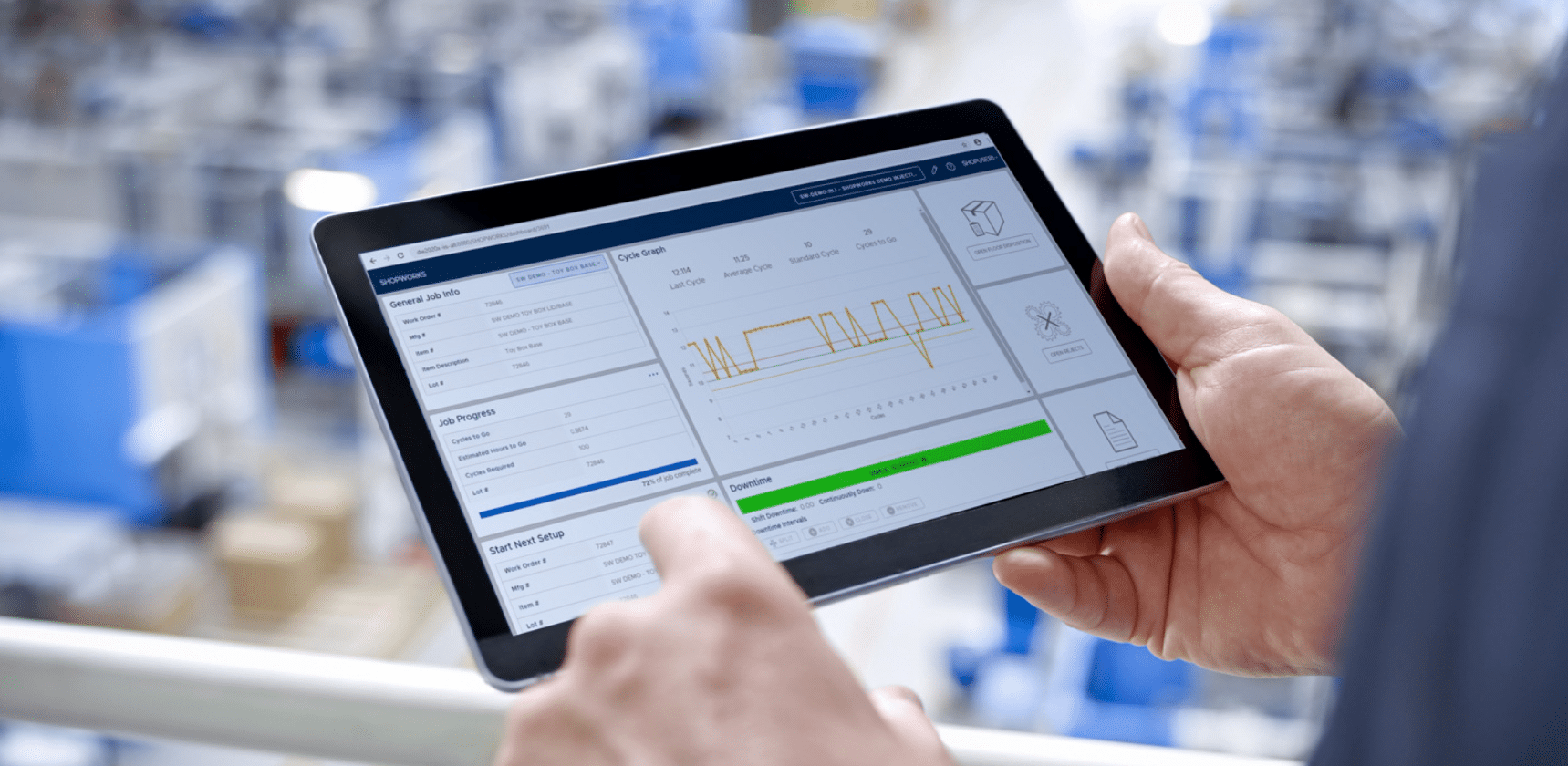Manufacturing Software – In the swiftly shifting realm of industrial production, embracing Manufacturing Software has become a linchpin for enterprises seeking to refine their manufacturing operations and maintain a competitive edge. This discourse delves into the pivotal facets of Manufacturing Software, its myriad benefits, and its transformative impact on the manufacturing domain.
Manufacturing Software
Pillars of Manufacturing Software
Strategic Production Orchestration
At the heart of Manufacturing Software lies the strategic orchestration of production planning and scheduling, which ensures judicious resource deployment, curtails idle time, and amplifies output.
Inventory Mastery
The software offers a robust suite of inventory management tools, empowering businesses to maintain an ideal inventory equilibrium and avert surplus, culminating in cost efficiencies and heightened operational effectiveness.
Assurance of Quality
A steadfast commitment to quality control is embedded within Manufacturing Software, equipping enterprises to consistently oversee and uphold product excellence, culminating in diminished flaws and elevated consumer contentment.
Perks of Manufacturing Software for Enterprises
Operational Efficiency Unleashed
Manufacturing Software markedly enhances efficiency by automating and refining manufacturing sequences, slashing lead times, boosting output, and achieving operational superiority.
Cost-Efficiency Realized
The meticulous production schedules, resource optimization, and inventory streamlining inherent in Manufacturing Software drive down costs, minimize waste, and cur curb unnecessary expenditures.
Elevated Product Standards
The software’s quality control capabilities ensure adherence to stringent standards, meeting customer expectations and mitigating the risk of expensive product recalls or rework.
Synergy and Integration within Manufacturing Software
ERP Symbiosis
Manufacturing Software flawlessly melds with Enterprise Resource Planning (ERP) systems, fostering a cohesive platform for all-encompassing business management and augmenting interdepartmental visibility and dialogue.
Cross-Departmental Convergence
Shattering operational silos, Manufacturing Software propels cross-departmental convergence, ensuring a unified approach from procurement to production and sales, thereby instilling agility and responsiveness within the organization.
Blueprint for Manufacturing Software Implementation
Holistic Needs Analysis
A thorough needs analysis is imperative pre-implementation, guaranteeing that the Manufacturing Software is meticulously tailored to the business’s distinctive requirements and workflows.
Empowering Through Education
The triumph of implementation is contingent on extensive employee education, mitigating change aversion, and certifying adept utilization of the software’s capabilities.
Navigating Implementation Challenges
Data Transitioning Complexities
Data migration presents its own set of complexities during implementation. A well-crafted data strategy and collaboration with seasoned consultants are crucial to navigating these challenges and ensuring a seamless transition.
Technological Adoption Hesitancy
The reluctance to embrace new technological solutions is natural. Articulating the advantages of Manufacturing Software and providing comprehensive support can alleviate such hesitancy.
Manufacturing Software Success Narratives
Case Study: Company Y’s Operational Leap
Company Y’s manufacturing operations underwent a remarkable leap in efficiency, with a 30% boost in production output, following the adoption of Manufacturing Software, particularly its production planning and quality control modules.
Manufacturing Software: The Road Ahead
Embracing Industry 4.0
The trajectory of Manufacturing Software is intertwined with integrating Industry 4.0 innovations, leveraging data analytics, artificial intelligence, and automation to foster more brilliant, more adaptable production methodologies.
The IoT and Intelligent Manufacturing
The infusion of the Internet of Things (IoT) into Manufacturing Software sets the stage for real-time process monitoring and control, propelling intelligent manufacturing solutions that enhance operational efficiency and reactivity.
Selecting the Optimal Manufacturing Software
Industry-Specific Considerations
Choosing manufacturing software that resonates with the specific nuances of an industry is critical, as it ensures that the solution addresses distinct challenges and complies with industry standards.
Manufacturing Software: The Dynamic Engine for Industrial Growth
In the fast-paced manufacturing world, the strategic adoption of Manufacturing Software is crucial for companies looking to streamline production processes and maintain a competitive edge. This exploration sheds light on the essential features of Manufacturing Software, its benefits, and its transformative effect on the industry.
Critical Attributes of Manufacturing Software
Adaptable Growth and Versatility
The ideal Manufacturing Software must be scalable to support business expansion and versatile enough to meet evolving demands, ensuring it remains a relevant solution as the company progresses.
Comparative Analysis with Other Tools
Manufacturing Software vs. MRP
While Material Requirements Planning (MRP) zeroes in on material coordination and production scheduling, Manufacturing Software offers various functionalities, including meticulous quality control and inventory oversight.
Manufacturing Software vs. ERP
Enterprise Resource Planning (ERP) systems provide an extensive toolkit for various business operations, whereas Manufacturing Software is finely tuned to enhance production efficiency.
Economic Models for Manufacturing Software
Subscription-Based Approach
Manufacturing Software typically adopts a subscription-based model, allowing businesses to scale services according to their needs and eliminating hefty initial investments.
Customization Costs
The foundational subscription includes essential features, but additional customization may lead to extra costs. Transparent discussions with providers are necessary for a clear financial understanding.
Security Protocols in Manufacturing Software
Data Protection through Encryption
Data encryption is a cornerstone of Manufacturing Software, ensuring sensitive information is securely shielded from unauthorized access.
Access Management via Role-Based Control
Manufacturing Software enforces role-based access control, granting precise user permissions and safeguarding necessary information and functions based on individual roles.
User Feedback and Endorsements
Positive Impressions
Users frequently commend Manufacturing Software for its significant impact on production efficiency, cost management, and product integrity. Its intuitive interfaces and comprehensive capabilities often receive high praise.
Opportunities for Enhancement
Feedback commonly calls for ongoing improvements in user training and system interfaces. Providers’ dedication to these areas promises continuous advancements.
Sector-Specific Applications
Automotive Industry
Manufacturing Software streamlines production schedules, manages intricate supply chains, and upholds rigorous quality control in the automotive sector, leading to heightened efficiency and product excellence.
Food and Beverage Industry
For the food and beverage industry, Manufacturing Software supports batch production, inventory control, and adherence to food safety standards, ensuring consumers receive top-quality products.
Final Thoughts
Manufacturing Software stands out as a pivotal instrument for the manufacturing industry, propelling efficiency, cost-effectiveness, and product quality. From production planning to quality assurance, its influence is extensive and impactful.
Frequently Asked Questions
1. Is Manufacturing Software suitable for small businesses?
- Yes, many Manufacturing Software solutions are scalable and suitable for businesses of all sizes.
2. How does Manufacturing Software contribute to cost reduction?
- Manufacturing Software optimizes production schedules, resource allocation, and inventory management, reducing waste and operational costs.
3. Can Manufacturing Software be customized to fit unique business processes?
- Many Manufacturing Software solutions offer customization options to align with specific business requirements.
4. How does Manufacturing Software differ from Material Requirements Planning (MRP)?
- While MRP focuses on material planning and production scheduling, Manufacturing Software covers a broader range of features, including quality control and inventory management.
5. What are the future trends in Manufacturing Software?
- Future trends include the integration of Industry 4.0 technologies and the adoption of IoT for more intelligent and more adaptive manufacturing processes.

